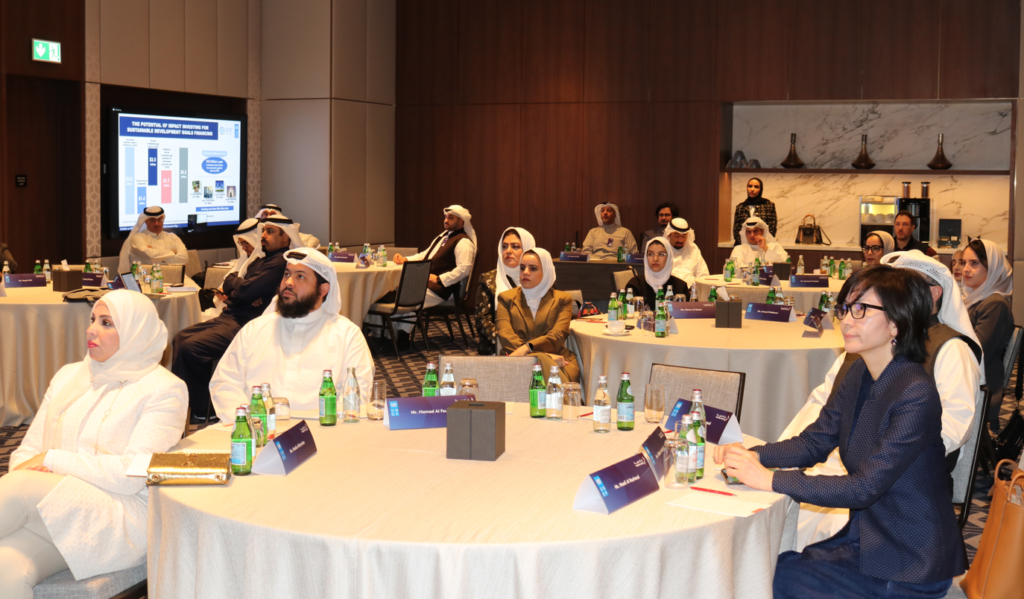Enhancing Capacities for Islamic Finance Impact Investing and Green Sukuk in Kuwait
December 28, 2022

UNDP and Warba Bank conducted the “Islamic Finance Impact Investing and Green Sukuk Training Program” in Kuwait City, Kuwait.
The objective of the program was to build the capacity of Islamic financiers, bankers and regulators in Kuwait in seizing new investment opportunities in the sustainable development area. It also aimed to educate the participants about the potential of green Sukuk as an innovative Islamic financial instrument that aligns with the concept of impact investing and contributes to the Sustainable Development Goals (SDGs).
The interactive training was opened by Mr. Hamad Al-Fouzan, Chief Strategic Planning Officer, Warba Bank, Ms. Nadia AlHamlan, the Assistant Secretary General Planning and Follow up – General of the Supreme Council for Planning and Development (GSSCPD), Dr. Sami Al-Suwailem, Acting Director General of the Islamic Development Bank and Mrs. Hideko Hadzialic, the Resident Representative, UNDP.
In his opening remarks, Mr. Hamad Al-Fouzan, highlighted that “Islamic finance, sustainable finance and green Sukuk are products that the financial sector needs to develop over the next decade”. Mr. Al-Ghanem also stressed that “In Kuwait there are many institutions and regulatory bodies implementing such initiatives for the sake of achieving Net Zero by 2050 as well as promoting environmental and sustainable governance initiatives under the ESG umbrella.”
Ms. Nadia Al-Hamlan, GSSCPD highlighted Kuwait’s commitment to reducing greenhouse gas emissions by 7.4% by 2035 based on the Nationally Determined Contributions (NDCs) and added that “The development plan of Kuwait aims to make a positive impact on society, and this cannot be achieved without defining strategies that direct all efforts towards achieving this goal. Impact investing is an effective strategy for producing beneficial social and environmental impacts in addition to financial gains.”
As the first supranational institution to issue green Sukuk in 2019, IsDB is highly committed to sustainability. Dr. Sami Al-Suwailem, stated that “In 2019, the Islamic Development Bank made an ambitious commitment that by 2025 at least 35% of its operations will be related to climate finance.” Dr. Al-Suwailem also highlighted IsDB’s successful mobilization of resources for green and sustainable development through the issuance of €1 billion for green Sukuk in 2019 and the landmark US$ 2.5 billion sustainability Sukuk in 2022.
Ms. Hideko Hadzialic, underlined the potential of Islamic finance as an alternative source of SDG financing, stating: “Islamic finance has global assets of US$ 3.4 trillion in 2020 with a projected growth rate of 8% per annum until 2025. Given its widening geographical reach in Asia and the Middle East and high growth potential in South America and Europe, Islamic finance is a promising but untapped source of financing for the SDGs.” Ms. Hadzialic added that leveraging zakat and waqf could be a great step in mobilizing those flows to the SDGs and to underfunded humanitarian and development needs. Lastly, Ms. Hadzialic highlighted UNDP’s efforts to position Islamic finance and impact investing as leading enablers of the implementation of the SDGs through promoting market-based solutions.
Following the opening remarks, Dr. Gülçin Salıngan, Deputy Director of UNDP IICPSD, presented Green Sukuk Initiative to mobilize Islamic finance and impact investing as an alternative financial tool for development. The four-day training programme was divided into 12 modules covering impact investing, Islamic financial instruments and contracts for impact investing, impact measurement and management tools, climate risk measurement tools, as well as Islamic green finance, trends and opportunities in thematic Sukuk, and green Sukuk, including its guiding principles, frameworks and case studies.

Through discussions on the conceptual understanding of impact investing and green finance within the context of Islamic finance, the training programme shared knowledge and insights on Islamic impact investing and green Sukuk. In addition to the theoretical discussions, the training programme equipped the trainees with practical knowledge through the examination of case studies and best practices in impact investing and green Sukuk from different jurisdictions.
The training was welcomed by 25 participants from Warba Bank, the Central Bank of Kuwait, the Capital Markets Authority of Kuwait and the Kuwait Direct Investment Promotion Authority (KDIPA). The programme’s comprehensive approach provided participants with the skills and capacity to develop Islamic finance solutions and implement them within their institutions.
This training was organized by the Global Islamic Finance and Impact Investing Platform (GIFIIP), which was established by UNDP Istanbul International Center for Private Sector in Development (IICPSD) and Islamic Development Bank (IsDB) Institute.

 Locations
Locations